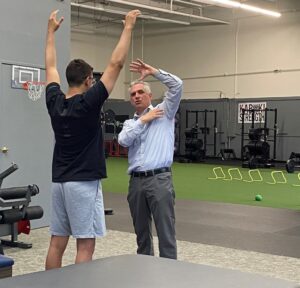Volleyball players getting injured is when, not if. So, when a player is told that he or shee need to see a doctor because of injury or illness, there can be a bit of fear:
- Fear that doctor will not appreciate the demands of volleyball.
- Fear that the player will be told simply “just stop playing.”
- Fear that the player and/or family may not know the questions to ask to get the most out of the visit.
It’s OK to be anxious and fear is a normal feeling, but how can you work through some of these unknowns?
Here are a few tips that can help you prepare and get the most out of your visit.
Before your visit
Dress ready to move and don’t forget your volleyball stuff
When going to a medical facility don’t be afraid to dress in a way that allows you to move comfortably. It is extremely difficult to examine a player’s hips and knees if they’re wearing tight jeans. Wearing short sleeve shirt can help with the shoulder or elbow exam. Coming in athletic apparel (including shoes) will allow a more comfortable and complete physical examination. Bring any extra equipment (even those smelly ankle braces or knee pads) and a list of medications and supplements.
Don’t go at it alone
Bring a family member, friend, or other trusted individual to help take notes, ask questions, and digest the information shared at the visit. If no one can be with you in person, ask if you can use a video call or a speakerphone option to have someone share in the visit.
Have a list of your goals (not those of coaches, parents, or even volleyball teammates)
Bring a schedule of upcoming practices, competitions, and other events. Ideally you the player should decide which are the most realistic and important goals in your recovery journey. Don’t be afraid to speak up and let everyone in the room know your targets. If there is a game coming up soon (like this weekend), have a realistic discussion about risks/benefits of performing and possibly worsening an injury or prolonging recovery. Yes, you want to be a good teammate, but your priority is your long-term health.
Ask genuine questions and express yourself
Share insights about what drives you and develop a true collaborative relationship with your medical team. The more that they know about you, the more they can meet your unique needs. ASK questions to get your needs met and if you forget something (it happens all the time), see if you can send a follow-up message…
Click Here to Read the Full Original Article at Volleyballmag.com…

